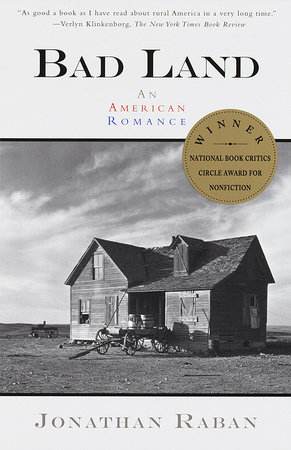
Several years ago, I worked in an office where we collected words. Any time any one of us would find an interesting word, we’d post it on the board. The main rule was that we had to have seen it in the course of our reading, whether it be in the newspaper, a book, or any publication but the dictionary (you couldn’t just read a dictionary to get your words). It was a kind of discovery game we would play.
Early on this blog, I posted about a book I was reading and the wonderful vocabulary used by the author (Theodore Dalrymple). Now, I don’t go out looking for authors that use a lot of interesting words, but when one comes along, I’ll start taking note. It goes back to the word game we’d play way back when.
You’ve also heard me singing the praises of Jonathan Raban lately. He, too, is one to use a lot of interesting words, and having just finished his book Bad Land: an American Romance, (yes, I’ve finished a book) I’ve got a new list of words. And I must not have been paying enough attention with Dalrymple, because two of the words on this list match the ones on his.

Oh, and I loved Raban’s book. I love his style. I mean, how many people can write 360 pages on the settling of Eastern Montana by homesteaders in the early 20th century and make it so interesting? Well, at least one.
When I started reading, I posted a couple of quotes I loved in the book. “I honked [at a herd of cows blocking the road], and was met by a unanimous stare of sorrowing resentment, as if I was trying to barge my way through an important cow funeral.” “It was so empty that two strangers could feel they had a common bond simply because they were encircled by the same horizon.”
I’ll end with a final passage that caught my eye: “God made the world, Man made Holland, and F. D. Roosevelt made the Fairfield Bench. After nearly sixty years, it still had the plain, angular, utility stamp of the New Deal on it. It looked like a government project. The town of Fairfield (“The Malt Barley Capital Of The USA”) could be seen from far off as a line of silver storage tanks, in whose shadow lay fifty or so more-or-less-identical single-story frame houses; tidy, white, decently maintained, irreproachably dull.”
And of course, the words…
| adumbrate | report or represent in outline. |
| ambit | the scope, extent, or bounds of something. |
| anneal | heat (metal or glass) and allow it to cool slowly, in order to remove internal stresses and toughen it. |
| caesura | (in Greek and Latin verse) a break between words within a metrical foot. |
| clement | 1. (of weather) mild. 2. (of a person or a person’s actions) merciful. |
| cornpone | rustic; unsophisticated. |
| crapulous | caused by or showing the effects of alcohol. |
| crepuscular | of, resembling, or relating to twilight. |
| demotic | denoting or relating to the kind of language used by ordinary people; popular or colloquial. |
| finical | another term for finicky |
| gimcrack | flimsy or poorly made but deceptively attractive. |
| graticule | a network of lines represnting meridians and parallels, on which a map or plan can be represented. |
| higgledy-piggledy | in confusion or disorder. |
| jodhpurs | full-length trousers, worn for horseback riding, that are close-fitting below the knee and have reinforced patches on the inside of the leg. |
| monitory | giving or serving as a warning; a letter of admonition from the pope or a bishop |
| nonagenarian | a person who is 90-99 years old |
| penury | extreme poverty; destitution. |
| perfidy | deceitfulness; untrustworthiness. |
| philoprogenitive | showing love toward one’s offspring. |
| piebald | (of a horse) having irregular patches of two colors, typically black and white. |
| ribald | referring to sexual matters in an amusingly coarse or irreverent way. |
| rubicund | (especially of someone’s face) having a ruddy complexion; high-colored. |
| shtetl | a small Jewish town or village in eastern Europe. |
| soi-disant | self-styled; so-called |
| solipsism | the view or theory that the self is all that can be known to exist. |
| sotto voce | (of singing or a spoken remark) sung or said in a quiet voice, as if not to be overheard. |
| trattoria | an Italian restaurant serving simple food. |
| uxorious | having or showing an excessive or submissive fondness for one’s wife |
| vatic | describing or predicting what will happen in the future. (adj) |
